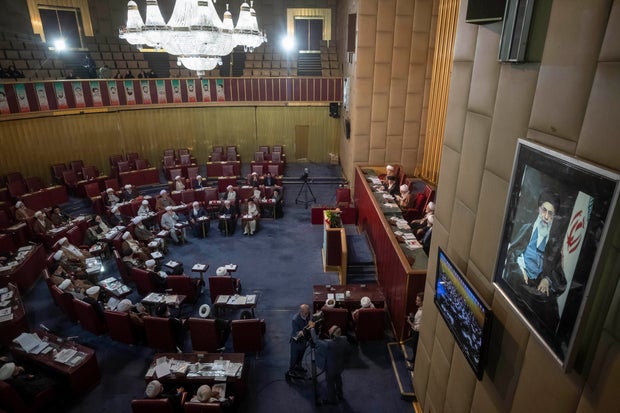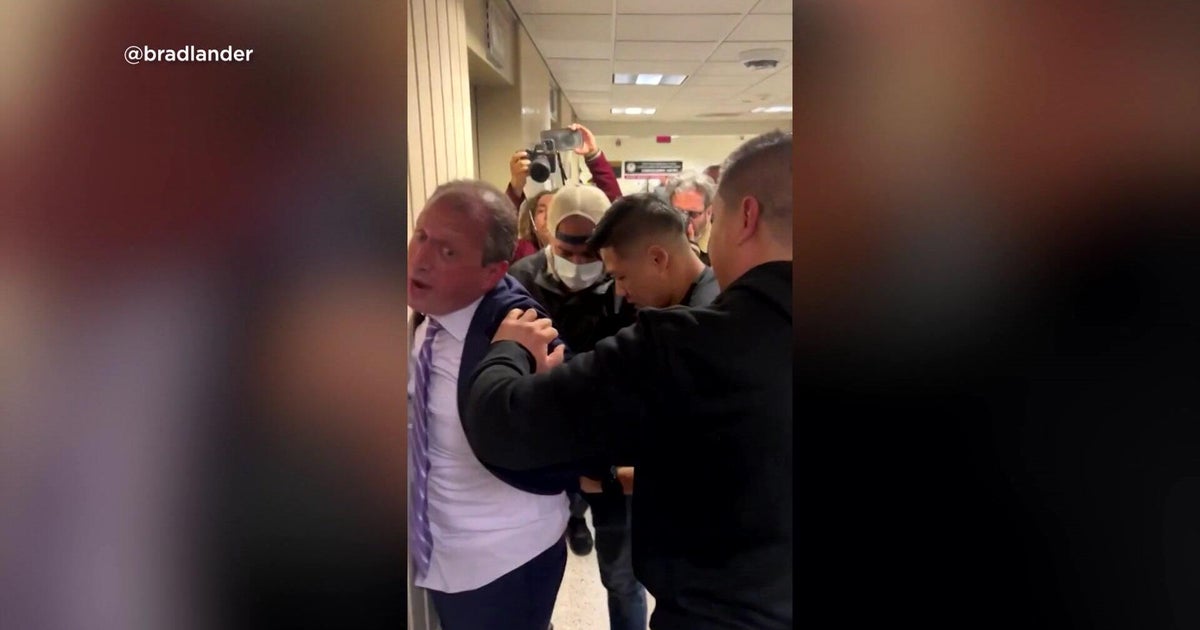Israeli Prime Minister Benjamin Netanyahu has not ruled out assassinating Iran's 86-year-old supreme leader Ayatollah Ali Khamenei, the figurehead of what he calls an "existential" threat to Israel. Netanyahu has made it clear that Israel would like to see, and even help to precipitate a change of regime in Iran, which has been ruled by a hardline theocratic government since the 1979 Islamic revolution.
On Friday, after ordering the first attacks on Iran's nuclear sites, Netanyahu said: "Israel's fight is not against the Iranian people. Our fight is against the murderous Islamic regime that oppresses and impoverishes you."
He urged the people of Iran "to unite around its flag and its historic legacy, by standing up for your freedom from the evil and oppressive regime," adding, "This is your opportunity to stand up and let your voices be heard."
 Iranian Supreme Leader Ayatollah Ali Khamenei speaks in Tehran, Iran, May 20, 2025.
Iranian Leader Press Office/Handout/Anadolu via Getty
Iranian Supreme Leader Ayatollah Ali Khamenei speaks in Tehran, Iran, May 20, 2025.
Iranian Leader Press Office/Handout/Anadolu via Getty
Asked by ABC News in an interview that aired Monday if Israel would try to kill Khamenei, Netanyahu would only say that his country was "doing what we need to do."
He rejected suggestions that such a move would be escalatory, however, saying: "It's not going to escalate the conflict, it's going to end the conflict."
Israel's strikes hit Khamenei's inner circle"I imagine the supreme leader is currently unable to sleep and worried about whether he'll be alive or not," Holly Dagres, a regional expert and senior fellow at the Washington Institute think tank in Washington, D.C., told CBS News on Monday.
Israel's ongoing strikes have killed several of Iran's top generals and security advisers to the ayatollah, dealing a blow to his inner circle, which, according to the Reuters news agency, consists of only 15 to 20 trusted loyalists. The dead include the commander-in-chief of Iran's elite Revolutionary Guards Hossein Salami, the chief of Iran's ballistic missile program Amir Ali Hajizadeh, and spy chief Mohammad Kazemi.
On Tuesday, Israel's military boasted about killing the man tapped to replace the Iranian military's chief of staff, just four days after it killed his predecessor in its first round of strikes.
An Israeli military spokesman said Iranian Chief of Staff Ali Shadmani "was eliminated at the Iranian regime's headquarters in the heart of Tehran," calling him "the man closest to Iran's leader Khamenei."
 A view of damaged vehicles in the Iranian capital, Tehran, following an attack by Israel, June 13, 2025.
Fatemeh Bahrami/Anadolu/Getty
A view of damaged vehicles in the Iranian capital, Tehran, following an attack by Israel, June 13, 2025.
Fatemeh Bahrami/Anadolu/Getty
But even if Israel were to kill the ayatollah himself, Dagres said Iran's clerical regime has an established process in place to keep the government stable.
Iran is not run by "one man and some generals""The thing with the Islamic Republic is this isn't just one man and some generals," Dagres told CBS News. "This is a system or an apparatus that has been thought through very extensively. The Islamic Republic has something that's akin to the (Vatican's) College of Cardinals — the Assembly of Experts, and they actually determine who gets to be supreme leader."
The top-level religious body, also known as Iran's Council of Experts, is composed of 88 senior Islamic clerics who are responsible for electing Iran's supreme leader, usually when the current one dies.
"From what we've been seeing so far, it doesn't sound like any of those people have been targeted" by Israel, said Dagres. "This is a replaceable regime in terms of leadership at the top, because they're prepared for the eventual death of a supreme leader."
 An interior view of the old Iranian Parliament building during Iran's Assembly of Experts' biannual meeting in Tehran, Iran, Nov. 5, 2024.
Morteza Nikoubazl/NurPhoto/Getty
An interior view of the old Iranian Parliament building during Iran's Assembly of Experts' biannual meeting in Tehran, Iran, Nov. 5, 2024.
Morteza Nikoubazl/NurPhoto/Getty
Even if Iran's entire theocratic system of government were to collapse, the upheaval would not necessarily guarantee a new government that is any friendlier to Iran's own repressed people, to Israel, or to the United States.
"There could be a scenario where the Islamic Revolutionary Guard Corps takes over, and they could go in different directions," said Dagres. "They could be more authoritarian. They can be more Western-friendly. We don't know. I think one of the lessons of the Arab Spring, up until the fall of Assad, was that what happens isn't always better."
Those Arab Spring pro-democracy uprisings across the Middle East in 2010 — in Egypt, Libya, Syria, Yemen and Tunisia — were initially met with hope in the democratic Western world, but in most of those countries, the bids for democracy either devolved into civil war, or were beaten back by new or returning authoritarian regimes or the rise of extremist groups.
Could internal tension threaten Iran's regime?Echoing Netanyahu, Israeli Defense Minister Israel Katz warned Iran's supreme leader on Tuesday he could suffer a fate similar to Iraq's former President Saddam Hussein. The Iraqi strongman's regime fell in 2003 after nearly a quarter century. He was found hiding in a bunker by U.S. forces and was then sentenced to death by a special Iraqi tribunal and hanged for crimes against humanity.
"I warn the Iranian dictator against continuing to commit war crimes and launch missiles toward Israeli civilians," Katz said on Tuesday. "He should remember what happened to the dictator in the neighboring country to Iran who took the same path against Israel."
Alon Pinkas, a former Israeli diplomat and commentator in Tel Aviv, told CBS News on Tuesday that the "kinds of tensions that cause a regime to fall are usually internal, not external."
"A country of 10 million cannot precipitate a regime change in a country of 90 million," Pinkas noted, highlighting the vast discrepancy in size between Israel and the much larger Iran, which he noted was also 1,100 miles away.
"For that to happen, for a regime change to happen, you need basically a reenactment of the failed Iraq invasion [by the U.S.] of 2003," Pinkas said. "And I don't think anyone wants that, certainly not the Americans."
He views Netanyahu's call for Iranians to rise up against their own leadership as "sheer arrogance."
"I doubt anyone living in Tehran and listening to Netanyahu would say, 'Oh, wow, you know, this is a call for action, I should get out and fight the regime because Mr. Netanyahu, a thousand miles away, told me to do so.'"
The last time mass anti-government street protests erupted in Iran was in 2022 with the so-called "Woman, Life, Freedom" movement. That outrage was sparked by the death of 22-year-old Kurdish-Iranian woman Mahsa Amini in the custody of Iran's religious police, reportedly after being detained for an improper head covering.
Netanyahu has repeated the three-word protest refrain in messages aimed directly at Iranians since his country launched its attacks late last week.
But those protests in Iran were quashed quickly — and aggressively — by Iranian authorities and had died down by the spring of 2023.
Since Israel started bombing Iran last week, no one has taken to the streets in Iranian cities. The country's residents appear to be focusing on the immediate threat, scrambling for shelter and to evacuate major cities as Israeli bombs fall.
"Why would you be on the streets if Israeli jets are bombarding those very streets or bombarding military targets not far from you," noted Pinkas. "They're driving away, as far away as possible from Tehran… but I think that when the dust settles — and that could be in two, three days, it could also be in three weeks, I honestly cannot predict that — I think a lot of that anger will be taken out on the regime."
In other words, even if Israel's actions don't prompt an immediate toppling of Iran's Islamic rulers, it could fuel Iranians' determination to stand up to their clerical leaders. If that happens, it could come at one of the ayatollah's weakest moments in almost half a century.
The Standoff with Iran More Ramy Inocencio






